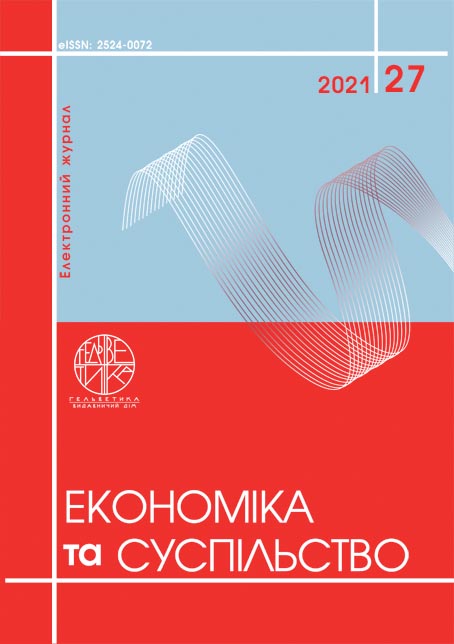ANOMALIES OF EGYPT’S FOREIGN TRADE
Abstract
The article is devoted to the study of Egypt's foreign trade. International trade provides positive economic effects and national well-being. The liberalization of Egypt's terms of trade has made it possible to intensify it, but different economic policies are pursued with respect to different trading partners. The purpose of the study is to identify Egypt's strategies of international trade in relation to its partners. The expected trade volume of Egypt has been calculated using the gravity model in the GRETL software product. Calculations have been made based on information from the United Nations Comtrade database. The application of tariff and non-tariff methods of foreign trade regulation have been investigated. The results of the study showed that Egypt's foreign trade is not explained by the gravity model. But the largest trading partners are countries that are located on a relatively large geographic distance. With territorial neighbors, trades much less. The reason for this is that Egypt's foreign trade is determined by political agreements and connections and less by economic factors, described by the gravitational model of international trade. The commodity structure of Egypt's exports does not correspond to the commodity structure of world demand. As a result Egypt exports goods not quite according to world demand, but goods that it can produce at the cheapest price. Egypt is actively using non-tariff measures to regulate foreign trade, which neutralizes the positive effect of reducing tariffs. As a result, foreign economic activity significantly slows down its development. Egypt actively protects tariffs in the primary sector of the economy, which puts the economy in a protectionist trap. On the basis of the obtained empirical data on the volumes of Egypt's imports and exports in the context of the countries of the world, as well as on the conditions of tariff and non-tariff regulation of trade operations, a typology of Egypt's foreign economic activity strategies in relation to strategic trading partners, in relation to the countries of the African region and relatively geographically close countries is proposed.
References
Egypt: Trade Statistics. URL: https://globaledge.msu.edu/countries/egypt/tradestats
El‐Enbaby H., Hendy R., Zaki C. Do SPS Measures Matter for Margins of Trade? Evidence from Firm‐Level Data. Applied Economics. 2016, vol. 48 no. 21, pages 1949‐1964.
Gal Y., Rock B. Israeli-Egyptian Trade: In-Depth Analysis. URL: https://institute.global/advisory/israeli-egyptian-trade-depth-analysis
Helmy O., Aboushady N., Zaki C. The Impact of Egypt-EU Free Trade Agreement on Egypt’s Manufacturing Exports and Employment. URL: http://library.fes.de/pdf-files/bueros/aegypten/15388.pdf
Helmy O., Aboushady N., Zaki C. The Impact of Egypt‐EU Free Trade Agreement on Egypt’s Manufacturing Exports and Employment. Friedrich‐Ebert‐Stiftung. 2018.
Kamal Y., Zaki C. How Do Technical Barriers to Trade Affect Exports? Evidence from Egyptian Firm‐Level Data. Journal of Economic Integration. 2018, Vol. 33, Issue 4, pages 659‐721.
Tellioglu I., Konandreas P. Agricultural Policies, Trade and Sustainable Development in Egypt. Geneva: International Centre for Trade and Sustainable Development (ICTSD) and Rome: United Nations Food and Agriculture Organization (FAO). 2017.
Zaki C., Ehab M., Abdallah A. How Do Trade Margins Respond to Exchange Rate? The Case of Egypt. Egyptian Center for Economic Studies Working Paper No. 189. 2017.
Egypt: Trade Statistics. (2021). Available at: https://globaledge.msu.edu/countries/egypt/tradestats
El‐Enbaby H., Hendy R., Zaki C. (2016). Do SPS Measures Matter for Margins of Trade? Evidence from Firm‐Level Data. Applied Economics, vol. 48 no. 21, pages 1949‐1964.
Gal Y., Rock B. (2018). Israeli-Egyptian Trade: In-Depth Analysis. Available at: https://institute.global/advisory/israeli-egyptian-trade-depth-analysis
Helmy O., Aboushady N., Zaki C. (2018). The Impact of Egypt-EU Free Trade Agreement on Egypt’s Manufacturing Exports and Employment. Available at: http://library.fes.de/pdf-files/bueros/aegypten/15388.pdf
Helmy O., Aboushady N., Zaki C. (2018). The Impact of Egypt‐EU Free Trade Agreement on Egypt’s Manufacturing Exports and Employment. Friedrich‐Ebert‐Stiftung.
Kamal Y., Zaki C. (2018). How Do Technical Barriers to Trade Affect Exports? Evidence from Egyptian Firm‐Level Data. Journal of Economic Integration, Vol. 33, Issue 4, pages 659‐721.
Tellioglu I., Konandreas P. (2017). Agricultural Policies, Trade and Sustainable Development in Egypt. Geneva: International Centre for Trade and Sustainable Development (ICTSD) and Rome: United Nations Food and Agriculture Organization (FAO).
Zaki C., Ehab M., Abdallah A. (2017). How Do Trade Margins Respond to Exchange Rate? The Case of Egypt. Egyptian Center for Economic Studies Working Paper No. 189.


